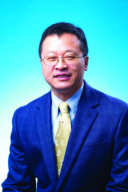中法核工程与技术学院第104期学术午餐会
Multiscale and Multiphysics Modeling and Simulations for Accident Tolerant Fuels with Improved Reactor Safety
中法核工程与技术学院第104期学术午餐会
104th Academic Lunch Seminar of Sino-French Institute of Nuclear Engineering and Technology
Topic: Multiscale and Multiphysics Modeling and Simulations for Accident Tolerant Fuels with Improved Reactor Safety
Speaker: Dr. ZHOU Wenzhong(周文忠)
Time: 12:40 – 14:00, Friday March 29, 2019
Venue: F309 in the teaching building, Zhuhai Campus, SYSU
Organizer: Sino-French Institute of Nuclear Engineering and Technology, Sun Yat-sen University
Language: English

Abstract:
After the Fukushima Daiichi accident, accident tolerant fuels have been put forward by both the governments and private companies in major nuclear energy promotion countries. However, the current database and understanding for the accident tolerant fuel are still limited. Considering light water reactor fuels operate in environments involving complex, multi-physical phenomena, and the behavior of multiple physics is often fully coupled, a fuel performance code called CityU Advanced Multiphysics Nuclear Fuels Performance with User Defined Simulations (CAMPUS) has been developed to predict the behavior of accident tolerant fuels in light water reactors. Besides, through the first-principles and molecular dynamics computations, a multi-scale database of material genome for accident tolerant fuels is being established, laying a theoretical foundation for accident tolerant fuels design and engineering applications. The key fuel performance parameters for the UO2 fuel predicted by the CAMPUS code are comparable to those obtained by BISON, ABAQUS and FRAPCON. The capabilities of the CAMPUS code were further demonstrated by simulating the performance of accident tolerant fuels, for example, enhanced thermal conductivity UO2-BeO, UO2-SiC and U3Si2 fuels, and the performance of accident tolerant claddings, such as SiC, FeCrAl and Zircaloy cladding materials coated with SiC and FeCrAl. These demonstrate that the CAMPUS code is a practical tool not only for the existing LWR fuel performance modeling but also for the accident tolerant fuel design, development and behavior prediction.
About the speaker:
Dr. ZHOU Wenzhong (zhouwzh3@mail.sysu.edu.cn), is an associate professor at IFCEN, Sun Yat-sen University. Prior to his current position, he was an assistant professor of Nuclear Engineering at City University of Hong Kong, and a research associate in Nuclear Systems Design and Analysis Group at Los Alamos National Laboratory. He obtained his Ph.D. in Nuclear Engineering at Purdue University in December 2010. His research interests are mainly accident tolerant fuels, multiphyics nuclear fuels behavior, multiphase flow, heat transfer, nuclear thermal hydraulics and severe accident management. Dr. Zhou has authored or coauthored more than 80 journal and conference articles.















 中法核工程与技术学院
中法核工程与技术学院 中法核工程与技术学院
中法核工程与技术学院